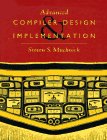
Programming Languages and Translators
Fall 2018
 |
||
| COMS W4115 Programming Languages and Translators Fall 2018 |
||
Class meets Mondays and Wednesdays 4:10 - 5:25 PM 451 CSB.
| Name | Office hours | Location | |
|---|---|---|---|
| Prof. Stephen A. Edwards | sedwards@cs.columbia.edu | see my home page | 462 CSB |
| John Hui | jzh2106@columbia.edu | T 3:30-5:30 | 487 CSB |
| Jennifer Bi | jb3495@columbia.edu | M 2-4 | 487 CSB |
| Mark Mazel | mm4764@columbia.edu | Th 5-7 | 487 CSB |
| Lauren Arnett | lba2138@columbia.edu | M 10-12 | 487 CSB |
| Dean Deng | dd2563@columbia.edu | Th 3-5 | 487 CSB |
| Justin Wong | jw3354@columbia.edu | T 12-2 | 487 CSB |
The goal of PLT is to teach you both about the structure of computer programming languages and the basics of implementing compilers for such languages.
The course will focus mostly on traditional imperative and object-oriented languages, but will also cover functional and logic programming, concurrency issues, and some aspects of scripting languages. Homework and tests will cover language issues. You will design and implement a language of your own design in a semester-long team project.
While few of you will ever implement a full commercial compiler professionally, the concepts, techniques, and tools you will learn have broad application.
COMS W3157 Advanced Programming: You will be dividing into teams to build a compiler, so you need to have some idea how to keep this under control. Quick test: you need to know about Makefiles and source code control systems.
COMS W3261 Computability and Models of Computation: You will need an understanding of formal languages and grammar to build the parser and lexical analyzer. Quick test: you must know about regular expressions, context-free grammars, and NFAs.
Alfred V. Aho, Monica Lam, Ravi Sethi, and Jeffrey D. Ullman. |
 |
Michael L. Scott. |
 |
Andrew W. Appel. |
 |
Lawrence C. Paulson |
 |
Steven S. Muchnick |
 |
The focus of 4115 is the design and implementation of a little language. You will divide into teams and design the goals, syntax, and semantics of your language, and implement a compiler for your language.
Exception: CVN students will do the project individually.
This is a critical part of the project and will be a substantial fraction of the grade.
Include the following sections:
 |
Dennis M. Ritchie, C Reference Manual |
| Kernighan & Ritchie, The C Programming Language | |
 |
The C Language Reference Manual (SGI) |
| Stroustrup, The C++ Programming Language | |
 |
The Java Language Specification |
 |
The C# Language Specification |
|
AP++:
List language
(MM)
Amit Patel |
|
BitTwiddler:
A language for binary data parsers
(SE)
Bruno Martins |
|
Casper:
MicroC with strings
(SE)
Michael Makris |
|
Coral:
Python-like language with gradual typing
(LA)
Jacob Austin, Matthew Bowers, Rebecca Cawkwell, and Sanford Miller |
|
FIRE:
Fire Input Reinterpretation Language
(JH)
Ayer Chan, Jason Konikow, Graham Patterson, Frank Spano, and Christopher Thomas |
|
Fli-O:
File I/O language
(JH)
Matthew Chan, Gideon Cheruiyot, Justin Gross, and Eyob Tefera |
|
GaE:
Graphs Ain't Easy
(DD)
Andrew Jones, Samara Nebel, and Kevin Zeng |
|
Grape:
Graph Manipulation Language
(DD)
James Kolsby, Nick Krasnoff, Po-Yu Wu, and Hyun Bin Yoo |
|
Graphiti:
Graph Language
(DD)
Emily Hao, Sydney Lee, Michal Porubcin, Andrew Quijano, and Alice Thum |
|
Hippograph:
High-Performance Parsing of Graphs
(JB)
Benjamin Lewinter, Irina Mateescu, Harry Smith, and Yasunari Watanabe |
|
IRIs:
Workflow Description Language
(JH)
Hanzhou Gu, Xuheng Li, Shulan TANG, and Pinxi Tai |
|
MATRX:
Matrix Language
(DD)
Alana Anderson, Pearce Kieser, Katherine Pfleger, Julia Sheth, and Nicholas Sparks |
|
MMM:
Image Matrix Manipulation Language
(LA)
Shenghao Jiang, Yixiong Ren, and Shikun Wang |
|
MathLight:
Matrix manipulation language
(JB)
Mingye Chen, Chunli Fu, Yuli Han, and Boya Song |
|
ProCSV:
CSV File Processing Languages
(JW)
Tahiya Chowdhury, Tabara Nosiba, and Tahsina Saosun |
|
PyLit:
Python-like language
(JW)
Ryan Loprete |
|
SCoLang:
Contract Fulfillment Language
(JB)
Sambhav Anand, Jackson Chen, Sushanth Raman, Varun Varahabhotla, and Kanishk Vashisht |
|
SOSL:
Set Operation Simplification Language
(LA)
Ryan Chun, Garrison Grogan, Ryan Koning, and Trisha Maniar |
|
SSOL:
Simple Shape Oriented Language
(MM)
Jeevan Farias, Daniel Mesko, and Madeleine Tipp |
|
Shoo:
Imperative and functional language
(JW)
Claire Adams, Samurdha Jayasinghe Mudi, Cindy Le, and Crystal Ren |
|
Tree++:
Tree Manipulation Language
(JW)
Allison Costa, Laura Matos, Jacob Penn, and Laura Smerling |
|
Typescript-on-LLVM:
Statically-typed scripting without the browser
(SE)
Ratheet Pandya |
|
Uni-Corn:
Hardware Description Language
(SE)
Maryam Aly, Adiza Awwal, David Lalo, Dan Sendik, and Gael Zendejas |
|
VSCOde:
Image Manipulation
(MM)
Jessica Cheng, Anna Lu, Hana Mizuta, Spencer Yen, and Kenneth Yuan |
|
ZEN:
Graphics Language
(MM)
Zoe Gordin, Eleanor Murguia, and Nadia Saleh |
|
bawk:
bad awk
(JH)
Ashley An, Christine Hsu, Mel Sawyer, and Victoria Yang |
|
text++:
PDF Generation Language
(SE)
Joi Anderson, Maria Javier, and Klarizsa Padilla |
![]() My favorites
My favorites
| 40 % Project |
| 20 % Midterm |
| 30 % Final |
| 10 % Homework |
You will collaborate with your own small team on the programming project, but you may not collaborate with others on homeworks. Teams may share ideas about the programming assignments, but not code. Any two teams found submitting similar code will receive zero credit for the whole assignment, and repeat offenses will be referred to the dean. See the Columbia CS department academic policies for more details.